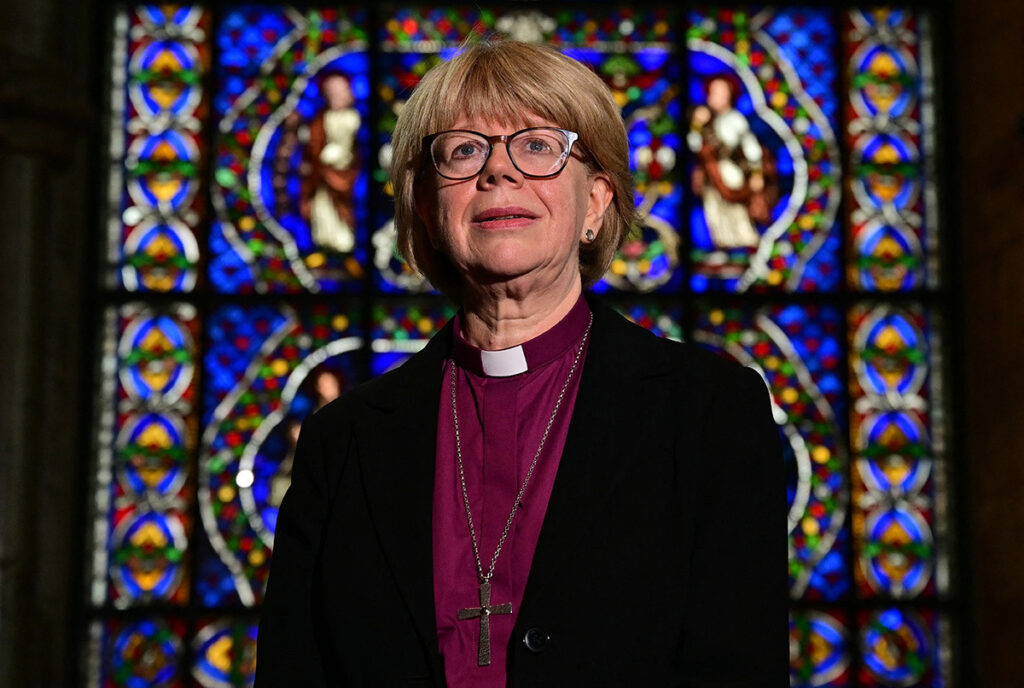**The Anglican Communion Just Split in Two**
It happened because the Church of England decided that 1,400 years of biblical faithfulness matters less than a headline.
—
### A Historic Appointment
On October 3, 2025, the Church of England announced Sarah Mullally, the 63-year-old Bishop of London, as the 106th Archbishop of Canterbury—the first woman ever to hold the post in the Church’s history. The celebration was immediate. British Prime Minister Keir Starmer praised her appointment. The Archbishop of York called it “delightful.” Progressive Anglicans hailed it as long-overdue progress.
But controversy followed just as swiftly.
Within two weeks, the Global Anglican Future Conference (GAFCON), a coalition of conservative Anglican provinces representing millions across Africa, Asia, and the Americas, issued a blunt statement: they will no longer recognize the authority of the Archbishop of Canterbury. The Anglican Communion, they declared, would be “reordered.”
—
### Breaking a 1,400-Year Tradition
The office of Archbishop of Canterbury dates back to 597 AD. For nearly 1,400 years, 105 men have held the post. The continuity of male leadership was rooted in the Church’s understanding of Scripture, tradition, and apostolic order. That pattern is now broken.
This is not progress. This is capitulation.
By appointing a woman to this historic role, the Church of England has signaled to the world that Scripture is negotiable when culture demands it.
—
### Why This Happened
The reasons for elevating Sarah Mullally to the highest leadership position within the Church of England are multifaceted, but three forces converged to make it happen now: cultural pressure, an institutional crisis, and theological compromise.
**Cultural Pressure:**
British society has fully embraced gender equity as an unquestionable good. To appoint another man would have been seen as regressive. The Church wanted to signal that it is “modern” and “relevant.”
**Institutional Crisis:**
The Church is hemorrhaging members as secularism rises. It is also staggering from a sex-abuse scandal that forced Justin Welby’s resignation in November 2024 after an investigation found he failed to act on serial abuse by a volunteer at Christian summer camps. Did the Church feel compelled to appoint a woman precisely because of this scandal? The conclusion is inescapable: male leadership has failed, so let’s try something different.
Never mind that the problem was not maleness but sin and institutional rot. The solution was not biblical reformation but cultural accommodation.
**Theological Compromise:**
To justify the decision to erase role distinctions, supporters of the new female bishop point to Galatians 3:28:
*“There is neither Jew nor Greek, there is neither slave nor free, there is no male and female, for you are all one in Christ Jesus.”*
However, Paul is speaking of salvation here, not church office. Likewise, supporters claim that 1 Timothy and Titus are culturally conditioned, but Paul grounds his instruction in creation order, not culture.
The real issue is whether Scripture is allowed to speak at all—or whether culture gets the final word.
—
### A Broader Shift
Here’s the deeper problem: In 2023, Mullally called the approval of marriage for same-sex couples “a moment of hope for the Church.” Speaking at Canterbury Cathedral after her appointment, she pledged to be “a shepherd who enables everyone’s ministry and vocation to flourish, whatever our tradition.”
That language sounds warm to some, but it signals surrender. The Church has chosen a leader who represents not just a shift on gender but a broader drift on sexuality, marriage, and biblical authority.
—
### What Scripture Actually Says
Scripture has much to say on these issues, particularly regarding women’s roles. While women can faithfully serve many important roles within the family and the Church, the office of elder, priest, bishop, or overseer is reserved for qualified men.
Paul writes to Timothy:
*“If anyone aspires to the office of overseer, he desires a noble task. Therefore, an overseer must be above reproach, the husband of one wife”* (1 Timothy 3:1-2).
The language is unmistakably male. The qualifications assume male headship both in the home and in the Church.
Paul also writes:
*“I do not permit a woman to teach or to exercise authority over a man; rather, she is to remain quiet”* (1 Timothy 2:12).
This verse is not about worth or dignity—men and women are equally made in the image of God, equally redeemed by Christ. Rather, it is about order, role, and God’s design for how His household should be governed.
Giftedness does not determine calling. God has designed the Church with a particular order that reflects the relationship between Christ and His Church. Just as Christ is the Head and the Church is His Bride, so the man is called to lead in the home and the Church in a way that mirrors that relationship (Ephesians 5:22-33).
To overturn that order is not just to change a policy—it is to obscure the Gospel itself.
—
### Tradition and Its Breakdown
The Anglican tradition, like the broader Catholic tradition, has always understood this. The historic creeds and confessions affirm male-only ordination. To break from this is not to “update” tradition—it is to abandon it.
And when you change one foundational pattern, you open the door to changing others.
– The Church of England first allowed women priests in 1994.
– Then women bishops in 2014.
– Now a woman archbishop.
Along the way, it began “blessing” same-sex unions and is now debating whether to formally recognize same-sex marriage.
Once you decide that Scripture’s teaching on gender roles is negotiable, you have no principled way to resist the next demand.
—
### The Global Fracture and Pattern of Decline
The Anglican Communion is a global fellowship of 85 million Christians in over 165 countries. But it is fracturing along theological lines.
GAFCON chairman Archbishop Laurent Mbanda of Rwanda said it plainly:
*“This appointment abandons global Anglicans, as the Church of England has chosen a leader who will further divide an already split Communion.”*
The conservative provinces, mostly in Africa and Asia, hold to the historic biblical position. They represent the majority of practicing Anglicans worldwide and are now taking steps to distance themselves from the Church of England.
GAFCON has announced the formation of the “Global Anglican Communion,” a new structure that rejects the authority of the Archbishop of Canterbury.
*“We have not left the Anglican Communion; we are the Anglican Communion,”* Archbishop Mbanda stated. *“The reset of our beloved Communion is now uniquely in the hands of GAFCON, and we are ready to take the lead.”*
—
### Conclusion
The Church of England’s historic decision to appoint the first female Archbishop of Canterbury has sparked a profound division in the Anglican Communion. At stake is not only leadership but the very understanding of Scripture, tradition, and biblical authority — foundations that have shaped the Church for nearly 1,400 years.
As this global fracture unfolds, the future of Anglicanism faces uncertain times. The question remains: Will the Church hold fast to Scripture, or will it continue to bend to the shifting tides of culture?
—
*Published on [Date]*
*Category: Church News, Anglican Communion, Theology*
https://www.christianpost.com/voices/the-anglican-churchs-split-when-the-culture-wins-over-scripture.html

